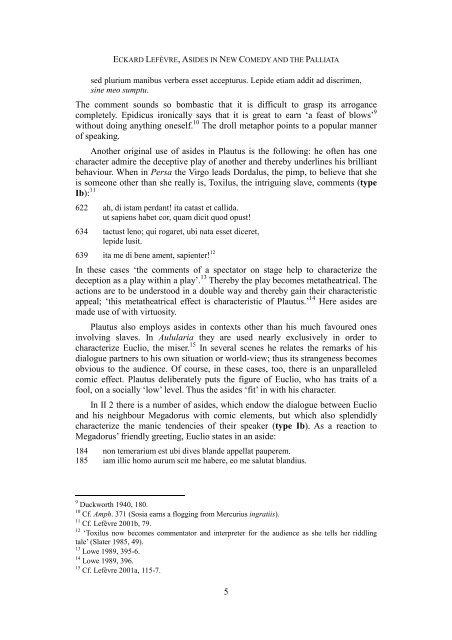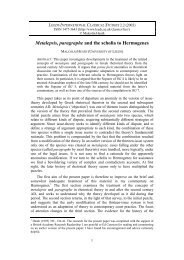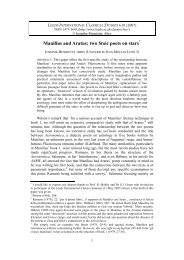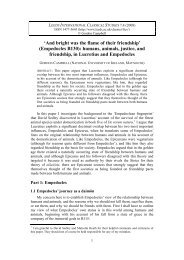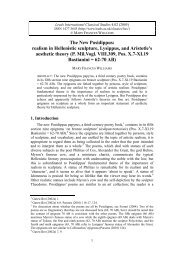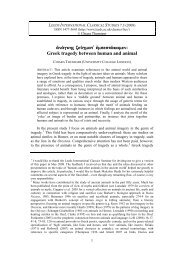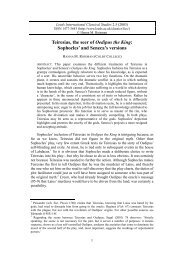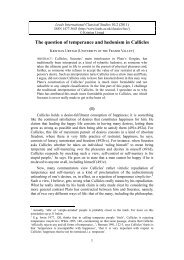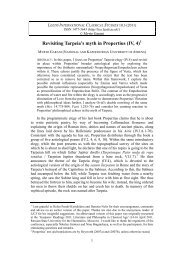Asides in New Comedy and the Palliata - Leeds International ...
Asides in New Comedy and the Palliata - Leeds International ...
Asides in New Comedy and the Palliata - Leeds International ...
Create successful ePaper yourself
Turn your PDF publications into a flip-book with our unique Google optimized e-Paper software.
ECKARD LEFÈVRE, ASIDES IN NEW COMEDY AND THE PALLIATA<br />
sed plurium manibus verbera esset accepturus. Lepide etiam addit ad discrimen,<br />
s<strong>in</strong>e meo sumptu.<br />
The comment sounds so bombastic that it is difficult to grasp its arrogance<br />
completely. Epidicus ironically says that it is great to earn ‘a feast of blows’ 9<br />
without do<strong>in</strong>g anyth<strong>in</strong>g oneself. 10 The droll metaphor po<strong>in</strong>ts to a popular manner<br />
of speak<strong>in</strong>g.<br />
Ano<strong>the</strong>r orig<strong>in</strong>al use of asides <strong>in</strong> Plautus is <strong>the</strong> follow<strong>in</strong>g: he often has one<br />
character admire <strong>the</strong> deceptive play of ano<strong>the</strong>r <strong>and</strong> <strong>the</strong>reby underl<strong>in</strong>es his brilliant<br />
behaviour. When <strong>in</strong> Persa <strong>the</strong> Virgo leads Dordalus, <strong>the</strong> pimp, to believe that she<br />
is someone o<strong>the</strong>r than she really is, Toxilus, <strong>the</strong> <strong>in</strong>trigu<strong>in</strong>g slave, comments (type<br />
Ib): 11<br />
622 ah, di istam perdant! ita catast et callida.<br />
ut sapiens habet cor, quam dicit quod opust!<br />
634 tactust leno; qui rogaret, ubi nata esset diceret,<br />
lepide lusit.<br />
639 ita me di bene ament, sapienter! 12<br />
In <strong>the</strong>se cases ‘<strong>the</strong> comments of a spectator on stage help to characterize <strong>the</strong><br />
deception as a play with<strong>in</strong> a play’. 13 Thereby <strong>the</strong> play becomes meta<strong>the</strong>atrical. The<br />
actions are to be understood <strong>in</strong> a double way <strong>and</strong> <strong>the</strong>reby ga<strong>in</strong> <strong>the</strong>ir characteristic<br />
appeal; ‘this meta<strong>the</strong>atrical effect is characteristic of Plautus.’ 14 Here asides are<br />
made use of with virtuosity.<br />
Plautus also employs asides <strong>in</strong> contexts o<strong>the</strong>r than his much favoured ones<br />
<strong>in</strong>volv<strong>in</strong>g slaves. In Aulularia <strong>the</strong>y are used nearly exclusively <strong>in</strong> order to<br />
characterize Euclio, <strong>the</strong> miser. 15 In several scenes he relates <strong>the</strong> remarks of his<br />
dialogue partners to his own situation or world-view; thus its strangeness becomes<br />
obvious to <strong>the</strong> audience. Of course, <strong>in</strong> <strong>the</strong>se cases, too, <strong>the</strong>re is an unparalleled<br />
comic effect. Plautus deliberately puts <strong>the</strong> figure of Euclio, who has traits of a<br />
fool, on a socially ‘low’ level. Thus <strong>the</strong> asides ‘fit’ <strong>in</strong> with his character.<br />
In II 2 <strong>the</strong>re is a number of asides, which endow <strong>the</strong> dialogue between Euclio<br />
<strong>and</strong> his neighbour Megadorus with comic elements, but which also splendidly<br />
characterize <strong>the</strong> manic tendencies of <strong>the</strong>ir speaker (type Ib). As a reaction to<br />
Megadorus’ friendly greet<strong>in</strong>g, Euclio states <strong>in</strong> an aside:<br />
184 non temerarium est ubi dives bl<strong>and</strong>e appellat pauperem.<br />
185 iam illic homo aurum scit me habere, eo me salutat bl<strong>and</strong>ius.<br />
9<br />
Duckworth 1940, 180.<br />
10<br />
Cf. Amph. 371 (Sosia earns a flogg<strong>in</strong>g from Mercurius <strong>in</strong>gratiis).<br />
11<br />
Cf. Lefèvre 2001b, 79.<br />
12<br />
‘Toxilus now becomes commentator <strong>and</strong> <strong>in</strong>terpreter for <strong>the</strong> audience as she tells her riddl<strong>in</strong>g<br />
tale’ (Slater 1985, 49).<br />
13 Lowe 1989, 395-6.<br />
14 Lowe 1989, 396.<br />
15 Cf. Lefèvre 2001a, 115-7.<br />
5


